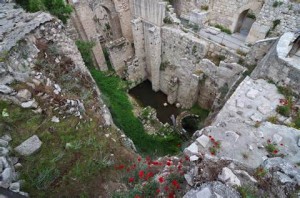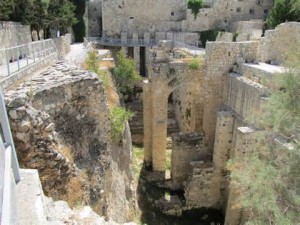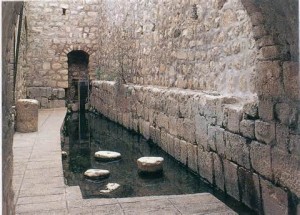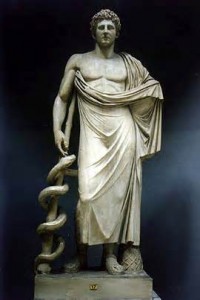Is the statement “God Helps those who help themselves” really in the Bible?
IT’S WORTH CONSIDERING
If you’ve been to Jerusalem, you may have visited the remains of the Pool of Bathesda, about a hundred yards inside St. Steven’s gate and adjacent to St. Anne’s church. It’s the site of the incident in John 5 where Jesus heals the man who had been lame for 38 years. This is the place where, so the story goes, an angel would periodically stir up the waters of the pool and the first one in got healed. Among the strange aspects of this story is the fact that of all those lying by the pool eagerly awaiting the “stirring,” those with the greatest need would have the most difficult time being first into the water. But that’s not the worst part. Since the pool was deep, whoever was a close second, along with everyone else, would find themselves immersed in a deep pool while still in their pathetic condition.
Bathesda, about a hundred yards inside St. Steven’s gate and adjacent to St. Anne’s church. It’s the site of the incident in John 5 where Jesus heals the man who had been lame for 38 years. This is the place where, so the story goes, an angel would periodically stir up the waters of the pool and the first one in got healed. Among the strange aspects of this story is the fact that of all those lying by the pool eagerly awaiting the “stirring,” those with the greatest need would have the most difficult time being first into the water. But that’s not the worst part. Since the pool was deep, whoever was a close second, along with everyone else, would find themselves immersed in a deep pool while still in their pathetic condition.
The belief that the first one in would get healed is not only strange, but it reeks of self-reliance. If you can just do this one thing, as difficult as it may be, you’ll be OK. The whole idea seems to lend credibility to the saying, “God helps those who help themselves.” According to researcher George Barna, eight out of ten Americans believe this statement is from the Bible. Actually it’s from Poor Richard’s Almanack by Ben Franklin. While the Bible promotes personal accountability and individual responsibility, it never advances the notion that self-reliance is a virtue. Instead, we are to trust in the Lord with all our heart, not leaning on our own understanding (See Pv. 3:5).
self-reliance. If you can just do this one thing, as difficult as it may be, you’ll be OK. The whole idea seems to lend credibility to the saying, “God helps those who help themselves.” According to researcher George Barna, eight out of ten Americans believe this statement is from the Bible. Actually it’s from Poor Richard’s Almanack by Ben Franklin. While the Bible promotes personal accountability and individual responsibility, it never advances the notion that self-reliance is a virtue. Instead, we are to trust in the Lord with all our heart, not leaning on our own understanding (See Pv. 3:5).
Trusting in God instead of ourselves is hard for many Americans to accept since we’ve grown up hearing and believing the idea expressed in the words of the poem “Invictus” that tell us that we are the masters of our fate and the captain of our souls.
AS I SEE IT
Since the whole idea of “the first one in gets healed” seems so un-biblical, what are we to make of the idea that the stirring of the water was caused by an angel? Doesn’t that lend credibility to the story? Should we rethink our theology? Or, since God is so clear on the dangers of self reliance, perhaps we should take a closer look at the angel.
Whenever we hear of the presence of an angel, our first reaction is to assume it is one of God’s angels sent to earth on a mission from God. But what if the angel in this story is not one of God’s messengers, but one of Satan’s fallen angels? What if the whole idea was part of Satan’s strategy to divert attention away from God and onto man and his imaginary ability to take care of himself if he just tries a little harder next time?
I find it quite a coincidence that a century after the time of Christ, this location became the site of a temple dedicated to the Greek God of healing, Asclepius. Perhaps by having such a temple built there, Satan was planting his “victory flag” just is he would begin to do through the followers of Mohammed five centuries later every time a mosque was built. It is no coincidence that nearly every Islamic “belief” runs contrary to the Word of God, especially the emphasis on self-reliance if one is to have any chance of entering Paradise.
God goes to great lengths to separate us from our self-reliance so we will have no choice but to trust in Him. Any time you read an account that elevates man and his own abilities to control his destiny, know that Satan is not far away, waiting to snatch any unsuspecting victims who have fallen into his trap. Those with eyes that see and ears that hear must be God’s ambassadors, leading people away from Satan’s snares and into the safe and loving arms of the Father.
to snatch any unsuspecting victims who have fallen into his trap. Those with eyes that see and ears that hear must be God’s ambassadors, leading people away from Satan’s snares and into the safe and loving arms of the Father.
ON THE LIGHTER SIDE
PHARMACIST
A helper on a farm






Leave A Comment